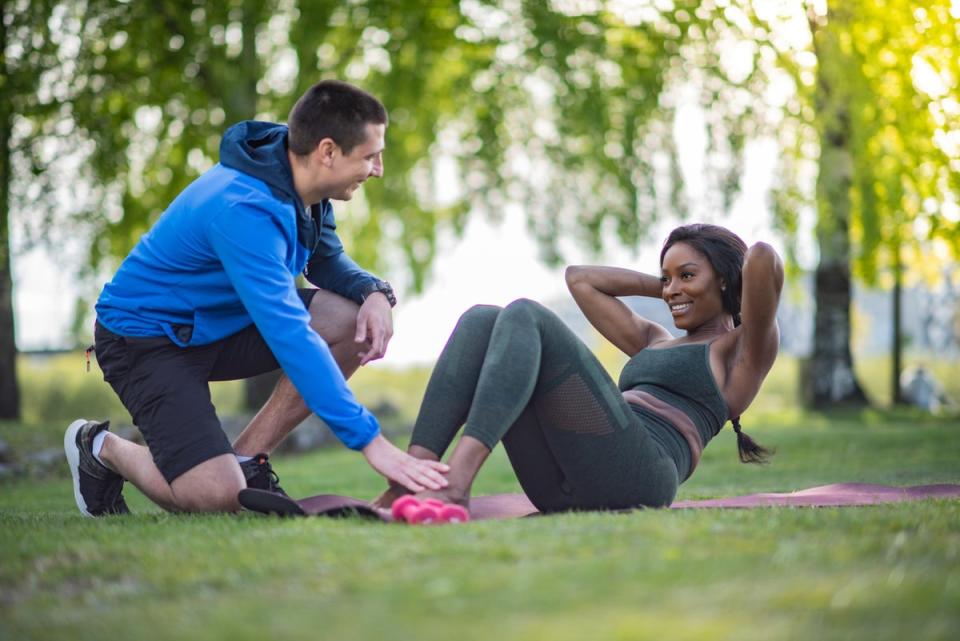Why breaking up with my personal trainer was harder than ditching a boyfriend

We first saw each other from across a crowded gymnasium, a rack of dumbbells between us. I was in my shiny Gym Shark gear. He had on a pair of luminous Hoka trainers. Our relationship progressed from there. We’d discuss our mutual stresses while planking side by side. He’d catch me when I tumbled mid-sumo squat. We made private jokes about my growing biceps. But there was a price: I was paying him £40 a session. Before you ask… no, I wasn’t in love with him. I was just extremely attached. And I knew one day I’d have to leave him.
My personal trainer and I were only ever meant to meet once – a one-off, complimentary class as part of my introduction to a local gym. But it had snowballed. I had ended up seeing him 26 times over the course of six months, strengthening my core in the process but also depleting my bank account. But breaking up this unholy contract between PT and newly keen gym-goer was one of the hardest things I’ve ever had to do. It was awkward. Uncomfortable. I felt guilty and embarrassed. Why couldn’t I let go?
As it turns out, many of us find it horrible to initiate a professional breakup. A quick Google search produces hundreds of advice articles prompted by the same kind of question: “How do I break up with a hairdresser without upsetting them?”; “The do’s and don’ts of ditching your doctor”; “Why is it so hard to dump my manicurist?”. Beauticians. Driving instructors. Nail artists. All inspire pangs of guilt when you decide to move on.
Anecdotally, many of my friends tell me they’ve been there too – though primarily with people who look after our hair. One person recalled practically hiding in a bush to avoid running into his former hairdresser while sporting a new hairdo cut by a rival. Another told me she’s in the process of two-timing her hairdressers: she gets her hair cut privately every other month by a stylist she adores, but goes in for occasional guilty trims at the local salon her stylist used to work at.
Becca Reed, a therapist who specialises in attachment theory, tells me that this kind of behaviour isn’t unusual. In fact, the blurring nature of these interactions – something professional and transactional but also emotionally supportive and intimate – might explain why we form close bonds with people who provide us with one-to-one services.
“It’s not just about the workout routine,” she says. “It’s about the connection and the comfort that person brings into our lives. We often feel a sense of loyalty to those we have trusted with our personal care. So, when we think about finding a new hairdresser or trainer, it’s not just a practical decision – it’s an emotional one. We might worry about hurting their feelings or fear the awkwardness of running into them after we’ve switched.”
I understood this completely. My trainer had become a friendly presence in my life; a sounding board for my woes. I also felt physically stronger after weeks under his tutelage. I could deadlift and goblet squat more than my body weight without falling over. I could finally do a pull-up. Well, an assisted one. We had built something together. I just didn’t have the heart to bring it to a close.

Confusingly, though, I find it easier to sever ties with a partner I’ve been romantically seeing. My relationship with my PT was purely platonic, but calling it off felt more anxiety inducing than any other breakup I’ve initiated in the past. In comparison to the state of modern dating culture, where disappearing on someone is almost normal, the commitment that comes with a professional relationship feels far more serious. Could we be clinging to the emotional safety net built into the dynamic from the start?
According to Timothy Frie, a social researcher who studies trauma in relationships, community is harder to come by these days, which explains why we might crave something that is regular and clearly defined. He explains that many people “feel lonely and isolated and lack a true sense of community and connection with others”. A professional dynamic, on the other hand, is one that is “predictable and safe”. We know what to expect from them – partly because we’re financing it – and there are rarely any surprises. “Some people feel a sense of psychological safety in these relationships that they don’t with other people in their life.”
Human vulnerability is key here, too. It’s often intimidating to be sat in the unflattering light of a hairdressing chair. And who feels comfortable being made to do a bear crawl to an audience of gym-goers? “They see us in vulnerable states,” Reed adds. “This may happen during a candid conversation while getting a haircut, or struggling through the last set of a workout. These moments of vulnerability foster a sense of closeness and familiarity, which are key components of attachment.”
In the world of beauty services, especially, those we seek out for aesthetic help might provide a self-esteem boost to clients who need them. That’s a central element in the attachment side of things, says Adrian Guffogg, a therapist and psychosocial practitioner at Acquiesce. “When we let someone physically change our appearance, we trust that they will do a good job,” he explains. By exposing our inner insecurities, we form an emotional attachment, or even look for a form of validation in the relationship. “If we find someone who delivers results that we are happy with, then it can be a worrying process to find someone else. Often, we end up repeatedly using that same stylist and developing a close bond.”

Personally, I became overly reliant on my trainer to coax me into exercising. There were certain exercises I would only do if he was there. Who else would catch the barbell if I dropped it? Who else could provide an on-the-spot pep talk? But it was also so expensive to keep it up. And as I started going alone, finding my groove as a newfound exercise fiend, I built the confidence to cut ties.
My breakup method was, in the end, a bit of a cop-out. After agonising over a script I had attempted to deliver in person several times, I dodged confrontation and sent an overly apologetic, five-minute-long voice message telling him that I just couldn’t afford to see him any more. It wasn’t him, I said without a hint of irony – it was me. He took it well. It turned out I didn’t have anything to worry about, either. That – of course – he wasn’t bothered by a client moving on. He’d even been seeing eight other people each day all along.


